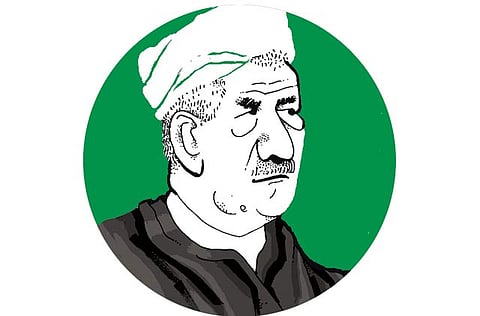Will Rafsanjani's gamble pay off?
Has risked his political future by using Khamenei's goodwill

Having vanquished all his political opponents, Iranian President Mahmoud Ahmadinejad has now bared his knuckles for one last decisive fight: getting main nemesis Akbar Hashemi Rafsanjani out of the fray.
A stalwart of the 1979 Islamic Revolution and Ayatollah Khomeini's right-hand man, Rafsanjani has come under attack from Ahmadinejad's allies in the past weeks, with some demanding his prosecution for "treason".
Rafsanjani, who served as president for eight years, sided with the now-opposition leader Mir Hussain Mousavi in the disputed 2009 presidential election and later criticised the massive crackdown on protesters. This put him in disfavour with hardliners and his longtime ally Ayatollah Ali Khamenei, the country's supreme leader.
He has since lost his envied status as Tehran's Friday prayers leader and a host of other privileges.
A savvy politician who has shaped events in Iran in the past three decades, Rafsanjani is fighting tooth and nail to remain in power. "My heart is full of the secrets of the regime," he once boasted. This is no exaggeration. No one doubts his role in grooming Khamenei to replace Ayatollah Khomeini as Supreme Leader after his death in 1989.
It is perhaps owing to this great service that the veteran politician has managed to stay afloat, still leading two substantial bodies in the Islamic republic: the Expediency Council, an advisory body to Khamenei, and the Assembly of Experts, a council of religious jurists overseeing the supreme leader.
Even so, Rafsanjani is going through one of the most painful phases of his political career since the revolution. What makes him so vulnerable is the controversy over his second son, Mahdi Hashemi, who is accused of corruption and inciting unrest in 2009. Hashemi now lives in exile in Britain.
Symbiotic relationship
The visceral hatred between Rafsanjani and Ahmadinejad goes back to their rivalry in the 2005 presidential election when Ahmadinejad popped up from virtual anonymity to beat the political old-timer. Khamenei's unreserved support for Ahmadinejad put the symbiotic relationship between him and Rafsanjani under severe strain, and their conflict finally came to a head during the 2009 electoral feud.
A liberal cleric with free market ideas, Rafsanjani is strongly opposed to Ahmadinejad's populist mandate and adventurous foreign diplomacy. But he has had no luck in stopping the president amid wholehearted support for Ahmadinejad from the supreme leader.
Mass protests in 2009 provided Rafsanjani an avenue to express his frustration with both the president and the supreme leader, and that exposed the once-untouchable figure to humiliating assault from right-wing forces. Last week, Intelligence Minister Heidar Moslehi made an implicit call for Rafsanjani to stand trial.
So far, Rafsanjani has managed to survive by the skin of his teeth — through astute manoeuvring and on merits of his long friendship with the Supreme Leader — but his political future hangs tenuously in the balance.
Ahmadinejad enjoys a wider freedom in exercising his executive powers than his predecessors. Although the president started his second term on a doubtful note, he has knocked out, sidelined or awed all his opponents.
Many personalities who initially tried to stay neutral in the struggle for power have now swung to Ahmadinejad's side, branding his adversaries as traitors.
But there is little doubt that the ashes of protests are still smoldering. This is something that Iranian leaders acknowledge openly and have so far been unable to douse. And this same knowledge might be the reason why Rafsanjani, the consummate politician, is holding fast to his critical outsider posture, while trying to bring in his influence to bear on the supreme leader.
Some think he has already had some success and Khamenei has tightened the leash on the president. For example, the supreme leader has resisted calls from hardliners for prosecution of the leaders of the Green Movement and last week he gave the Expediency Council the prized authority to check the president's fiscal powers.
Ahmadinejad had lobbied hard to keep the right to appoint or sack the head of the central bank, but now it is up to Rafsanjani's council to decide about the matter.
Although there is still no sign that Khamenei is drifting apart from his endeared protégé, Ahmadinejad, his latest move was a badly-needed boost to Rafsanjani, especially since the Expediency Council had been virtually stripped of power since the last presidential election.
Ahmadinejad, who is a member of the council, has refused to attend its sessions, giving the impression that he doesn't recognise Rafsanjani's stronghold.
It is yet to be seen if this stroke of luck will last for Rafsanjani. In any case, many believe him to be a resilient statesman and an ultimate survivor. It's either that or he simply knows too many secrets to mess with.
Mehrdad Balali is a journalist and writer. His first novel Houri was published in New York last year.


